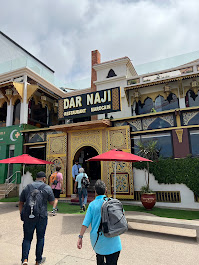Merci
Culture is important, and it helps define who we are. There are many different cultures, but everyone has their own. One cultural identity I have noticed is that many Moroccans have accepted some ways of the French especially when adopting their language. Many Moroccans speak French as one of their many languages because it is still being taught in schools. In the schools back home, Spanish and French are offered, but most students only have to take a foreign language for two to three years and maybe in college. Some people lose the way of the language if they do not use it often. However, many people in Morocco speak many languages such as Arabic, French, Spanish, English, etc.
Furthermore, when we were eating lunch at Dar Naji, we had a younger server. Derek was trying to be kind, and telling the server “Merci” which means ‘thank you’ in French when he would place food on the table or got plates out of our way. After about the third time the server had asked Derek to stop saying “Merci” because he did not like it, and he stated that he also wanted to work on his English. Derek did not mean to be rude; however, the server did not like being spoken to in French which is understandable. We, or at least I, assumed that most Moroccans wanted to be spoken to in French since many of the places we have gone to they have spoken mostly in French, but for instance, this was not the case. I have assumed that some of the Moroccan culture is an adoption of the French culture such as language because the French had colonized Morocco for so long. However, in this situation, the young server did not want to be part of the culture that included the French language unlike many Moroccans that I have met. I wish he could have sat down and had a conversation because I would have loved to understand more on why he did not like when Derek said “Merci.” Was it because he despised the French, maybe he did not enjoy the language or was he actually irritated that he knew we did not know French and sounded like fools? There are so many questions. I wish I could have asked him questions, but I did not want to invaded his personal life while he was doing his job.
Moreover, language can be a fault line in some culture. The young server at the restaurant is just one example. Many people may want to stop speaking French or learning it in schools while others may want to keep the language alive in Morocco. As I read some articles, one statement stood out which was: "A large number of Moroccans launched a campaign on social networking sites, demanding the replacement of the French language," (Al-Estiklal Newspaper, 2021), and people want to replace French from being taught in school. French being taught in schools even though it is not the official language of Morocco shows how the French influence is still present even though Morocco gained their independence from France over 60 years ago.
The French influence is present even after so many years, but I cannot help but wonder if the younger generations will want to do away with some influences such as getting rid of teaching French in schools.



I love that you're writing about this since I too have been thinking of this a lot over the past few days. I may be able to give you a bit more insight since I have heard Hamid discussing this very topic a few times. Hamid states that because of the fact that the French were the colonizers here, and have done much harm in this way to Morocco, that many Moroccans dislike the French and French influence here. I can very much understand that since this is true, the French language is a consistent reminder of their colonization.
ReplyDeleteI also wrote about language, and I must say I had a similar experience confronting my understanding of language in Morocco. I too believed that the Moroccan dialect indicated a baseline french competency but I realized this to not be the case in an interaction I had with the gentleman who helps us on the bus trips. I began to speak some basic, albeit, broken french to him until I realized by the confusion between both our faces, that he did not speak french (nor did he have french vocabulary). Upon further research and discussions from our farm and university visits I understood the complexity of language in Morocco and just how varied the dialects and languages spoken here are.
ReplyDelete